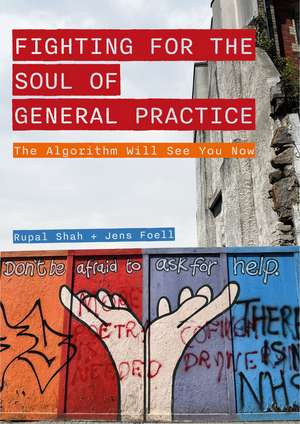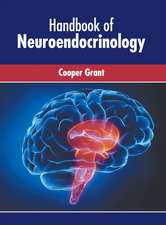Fighting for the Soul of General Practice: The Algorithm Will See You Now: Global Health Humanities
Autor Rupal Shah, Jens Foellen Limba Engleză Paperback – 23 ian 2024
In Fighting for the Soul of General Practice, two practicing doctors share their experiences of working within the underfunded and highly bureaucratic health system in the United Kingdom. Drawing on years of experience treating a wide range of patients from all backgrounds, they show what is lost when regulation overrules relationships, standard practice eliminates discretion, and algorithms displace personal attention. While acknowledging that bureaucracy is inevitable and important, they argue for an approach to medicine that is about creating meaning for doctor and patient and that privileges connection, attention, and care within each encounter.
Preț: 146.90 lei
Preț vechi: 154.62 lei
-5% Nou
Puncte Express: 220
Preț estimativ în valută:
28.11€ • 30.06$ • 23.44£
28.11€ • 30.06$ • 23.44£
Carte disponibilă
Livrare economică 27 martie-10 aprilie
Livrare express 13-19 martie pentru 22.43 lei
Preluare comenzi: 021 569.72.76
Specificații
ISBN-13: 9781789388398
ISBN-10: 1789388392
Pagini: 258
Ilustrații: 15 halftones
Dimensiuni: 146 x 210 x 18 mm
Greutate: 0.32 kg
Editura: Intellect Ltd
Colecția Intellect Ltd
Seria Global Health Humanities
ISBN-10: 1789388392
Pagini: 258
Ilustrații: 15 halftones
Dimensiuni: 146 x 210 x 18 mm
Greutate: 0.32 kg
Editura: Intellect Ltd
Colecția Intellect Ltd
Seria Global Health Humanities
Notă biografică
Rupal Shah is a doctor in London and associate dean for Health Education England. Jens Foell is a doctor and academic.
Cuprins
List of Figures
Acknowledgements
Prologue
Introduction: Standardising General Practice
1. Weaponized Bureaucracy: Bureaucracy as a Source of Injustice
2. Pigeonholes: Medical Categories
3. Guidelines, Tramlines, Mindlines: Interpreting the Evidence
4. Waiting to Connect: Algorithms That Dictate Access
5. Taking Liberties: Regulating the Mental Health Act
6. Passports for Passing: The Bureaucracy of Death
7. A Labour of Love: Why It Is That General Practice Is Still a Good Place to Work
8. Final Reflection – Image Reviewing
Conclusion
Bibliography
Index
A Labour of Love -a few stories to end, of healthcare enacted with love
Acknowledgements
Prologue
Introduction: Standardising General Practice
1. Weaponized Bureaucracy: Bureaucracy as a Source of Injustice
2. Pigeonholes: Medical Categories
3. Guidelines, Tramlines, Mindlines: Interpreting the Evidence
4. Waiting to Connect: Algorithms That Dictate Access
5. Taking Liberties: Regulating the Mental Health Act
6. Passports for Passing: The Bureaucracy of Death
7. A Labour of Love: Why It Is That General Practice Is Still a Good Place to Work
8. Final Reflection – Image Reviewing
Conclusion
Bibliography
Index
A Labour of Love -a few stories to end, of healthcare enacted with love
Recenzii
"Drs. Shah and Foell lay out a diagnosis of what is wrong in the contemporary practice of medicine: excessive protocols, productivity measures, digitalization, and restrictive algorithms that come between the humanity of the physician and the humanity of the patient. When doctors become "street-level bureaucrats" (38) their allegiances are torn between doing what the institution demands and what the patient needs. This is truly a loss of soul for both physician (leading to burnout, compassion fatigue, and moral injury) and for the patient (dehumanization, de-individualization, and being processed and protocolized). Although the authors work in the National Health Service (NHS) in the UK, their vignettes resonate with doctors in the US dealing with fragmentation of care, layers of bureaucracy, and prior authorization with insurance companies, while working in large institutional healthcare systems.
The authors give numerous clinical vignettes that illustrate the tensions between institutional medicine and individualized care. Their prescription for healing is found in their attention to the stories of their patients; their own stories of resistance by sneaking healing back into medicine through "micro-breaches" (194) of generosity within the institutional machine; and their work to connect to the full humanity of themselves and share that with the full humanity of patients.
Drs. Shah and Foell give us hope for practice within institutional settings by reminding us to always search for the story and soul of healing in medicine, so that we can be good human beings as well as good technicians and protocol managers."
The authors give numerous clinical vignettes that illustrate the tensions between institutional medicine and individualized care. Their prescription for healing is found in their attention to the stories of their patients; their own stories of resistance by sneaking healing back into medicine through "micro-breaches" (194) of generosity within the institutional machine; and their work to connect to the full humanity of themselves and share that with the full humanity of patients.
Drs. Shah and Foell give us hope for practice within institutional settings by reminding us to always search for the story and soul of healing in medicine, so that we can be good human beings as well as good technicians and protocol managers."
"With increasing bureaucracy, doctors struggle to take the life pressure [sic] of their patients. This book offers a compelling reflection on the importance of listening to patient stories as opposed to applying chilly algorithms for human care. The authors provide the reader with a lively under-the-rug inspection of street-level medical practice and the turbulent business of managing through bureaucratic demands."
"UK general practice is at a precarious crossroads. This book captures the essence of traditional, relationship-based, family doctor care, which is now under threat from a number of forces—not least the technologization of medicine and the inexorable encroachment of algorithmic, if-then decision-making on relational and narrative-based clinical method. At the very least, Shah and Foell have documented the essence of what we risk losing. Perhaps, if their warnings are heeded, they will also succeed in retaining and restoring what they rightly describe as general practice’s "soul.""
"This is an honest dispatch from the frontlines of the conflict between industrializing bureaucracies and the ongoing care of each person. It is a hopeful song for clinicians who, when the algorithm says no, breach the protocol and go the extra mile for each patient."
"A rich, wonderful, profound and moving book. I was immersed in the many stories and heartfelt, sometimes harrowing, observations. The need to innovatively transform health and social care, and particularly mental health care, by integrating the work of primary care with social care, local councils, voluntary sectors, communities, patients and families is now vital. Written in an authentic and deeply compassionate way, Fighting for the Soul of General Practice provides a broad and comprehensive understanding of the issues and challenges we face."
"A wonderful analysis of where GP/ primary care sits just now in UK and the cumulative effects of misapplied EBM and service changes based on algorithms and guidelines. [...] I also found it very moving indeed. The patients' stories [...] resonated with me strongly and reminded me of many similar situations of great complexity during my time as a GP. And I agree often the key to the best --or least bad-- outcome is the doctor engaging at a human level with the patient, and the family. [...] I was really pleased to see that [the book] highlights the importance of emotional engagement and imagination."
"For medical practitioners in the UK, the publication is an important and easy to read addition to the quest for improvement in NHS primary care. For readers outside the UK, the specificities may make the book less directly relevant; however, it can be read as a warning of potential traps to other health systems, and the narratives are of interest on their own.
The issues are illustrated through short stories about interactions with patients, followed by reflections on the state of affairs. Family doctors everywhere will surely recognize in the vignettes clinical encounters they have had themselves... The narratives are nicely crafted and alluring; they are able to show how many services, like telemedicine, phone consultations, and online questionnaires (all of which supposedly give more access or speed up processes) actually end up being an extra barrier for many people."
The issues are illustrated through short stories about interactions with patients, followed by reflections on the state of affairs. Family doctors everywhere will surely recognize in the vignettes clinical encounters they have had themselves... The narratives are nicely crafted and alluring; they are able to show how many services, like telemedicine, phone consultations, and online questionnaires (all of which supposedly give more access or speed up processes) actually end up being an extra barrier for many people."
"The book is believably rich in common and plausible (being based on experience) general practice narratives. With apology and credit to the authors I fully intend to ‘mine’ it as a sourcebook for teaching, and as a text to recommend to sixth formers, medical students, foundation years, and GP trainees... Taken as an entire scholarly work (a thesis) the book is a scholarly travelogue of day-to-day activities in general practice from the practitioner’s viewpoint, and as such it can be a lingering and emotional read... The GP reader connects with the narrative archetypes of current practice in the stories. I feel as I read that it is both familiar and strange. You don’t have to feel what the authors are feeling but the stories and the reflections on them are relatable to the GP, and potentially to other kinds of street-level bureaucrat. While the context of the book is very British, I invite colleagues in primary care and other street-level professions to consider that, like a good ethnography, much of the narrative and subsequent reflection is transferable... Fighting for the Soul of General Practice feels like a strong manifesto for the human and humane aspects (the soul) of general practice."



















